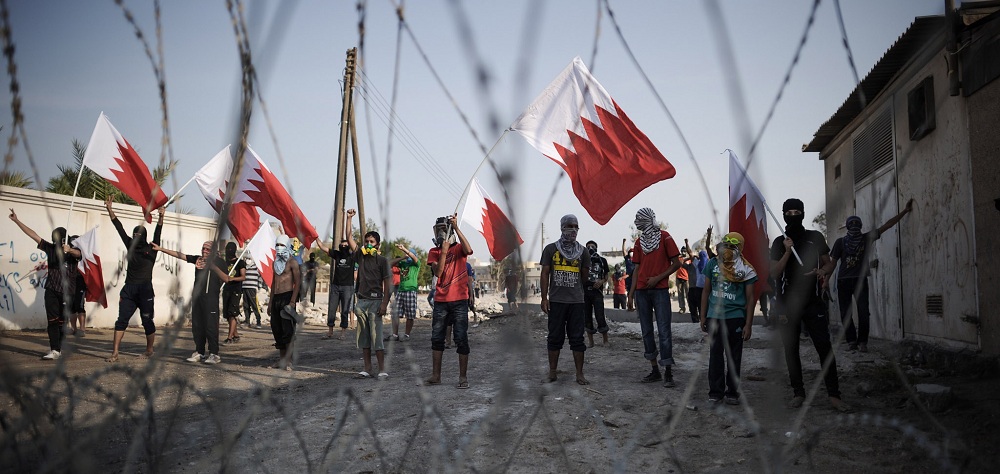Alwaght- Despite the fact that the Shiites are the majority in Bahrain a West-backed Sunni minority, led by the Al Khalifa, is ruling the tiny Persian Gulf island.
Al Khalifa’s rule began in 1783 and has continued to date. The country, with 767 square kilometers of size, fell to the hands of Hamad bin Isa bin Salman Al Khalifa since 1999. The ruler, feeling that Shiite citizens developing increasing knowledge of the democratic values, implemented a policy of crackdown and elimination politically, socially, and economically.
The repression against the Shiites, much of them Twelver Shiites, continued until 2011, the year when the people, taking cues from a wave of anti-dictatorship uprisings in the Arab region, rose their voice against the rule of Al Khalifa. But the ruling family countered the revolution with an iron fist as it was aided by Saudi Arabia and other despotic regimes. The revolt continued in the next years, reflecting immense antipathy to the Al Khalifa rule. The ruling family responded by shoring up its clampdown campaign unprecedentedly, drawing protests on the global stage.
So far, many international rights organizations have officially disparaged repression of the Shiite citizens in Bahrain. The Shiites in the new conditions are on the track of being gradually eliminated. Three regime policies set off the alarm bells to the Shiites:
Shiites marginalized from various social stages
Discrimination in offering equal opportunities in a variety of social, economic, and political areas is the regime’s top policy against the Shiite citizens. The government presses with its anti-Shiite policies so brazenly that even its Western allies, on top of them the US, admit that the Shiite citizens are subjected to big discrimination. Americans for Democracy and Human Rights in Bahrain (ADHRB), a human rights watchdog focusing on Bahrain, this month published a report on the predominantly Shiite Bahraini natives, dubbed Baharna, bringing in spotlight their grave conditions. The report suggests that the Baharna account for 70 percent of the country’s population. They are, the report says, are exposed to substantial discrimination in social welfare, employment, education, and culture.
According to the report, the Baharna, also called Bahranis, are deprived of the right for education in their faith, as they also face a big challenge in job opportunities access. The ADHRB’s report adds that the native Bahrainis constitute the lower economic class of the society, with the Manama regime systematically depriving them of education, welfare, and medical services.
Demographic changes
Al Khalifa also resorts to manipulation of the population demographically to transform the Sunni population into the majority as part of a strategy to impair the Shiite base. According to field investigations, the ruling regime has launched organized demographic change programs over the past three decades to decrease the Shiite population. The regime brings Sunnis from Syria, Yemen, Pakistan, Bangladesh, and India with the guarantee of job opportunities, housing, and other social benefits to push the Shiites into a minority. Field realities show that the migrants, also called “the citizenized” locally, have reduced the proportion of the Shiite population. In 2001, for example, the Shiite population was 85 percent but in 2008 it fell to 70 percent. Since the 2011 uprising, some 15,000 Baathist Iraqis were moved to Bahrain from Jordan.
In 1999, Bahrain’s population was 700,000. The number increased to 1.250 million in 2012, with 350,000 of them being the citizenized people. The experts now warn that if the current demographic change policy goes on, over 80 percent of the Bahraini population will be Sunnis in 2050.
Anti-Shiite crackdown and citizenship revocation
Over the past few years, the Al Khalifa regime increasingly sent to prison the rights and civil activists and Shiite clerics under political motivations. According to a report jointly issued by ADHRB and Iraq Development Organization (IDO), the Bahraini regime continues its clampdown against the Shiite citizens and clerics. The representative of the two organizations, reading his report for the United Nations Human Rights Council’s session this year, maintained that only during 2017, Manama authorities restricted, detained, prosecuted, and tried over 70 Shiite clerics as part of an anti-opposition crackdown.
Another repressive and crueler tactic adopted by the US-backed Al Khalifa is forcing the detainees out of the country or stripping them of their Bahraini citizenship. In June 2016, the Bahraini ruler revoked the citizenship of top Shiite cleric Sheikh Isa Qassim. The regime’s pressure to weaken the Shiite roots in the country is in its climactic point now, amid diplomatic, military, and financial cover offered by Saudi rulers.



























